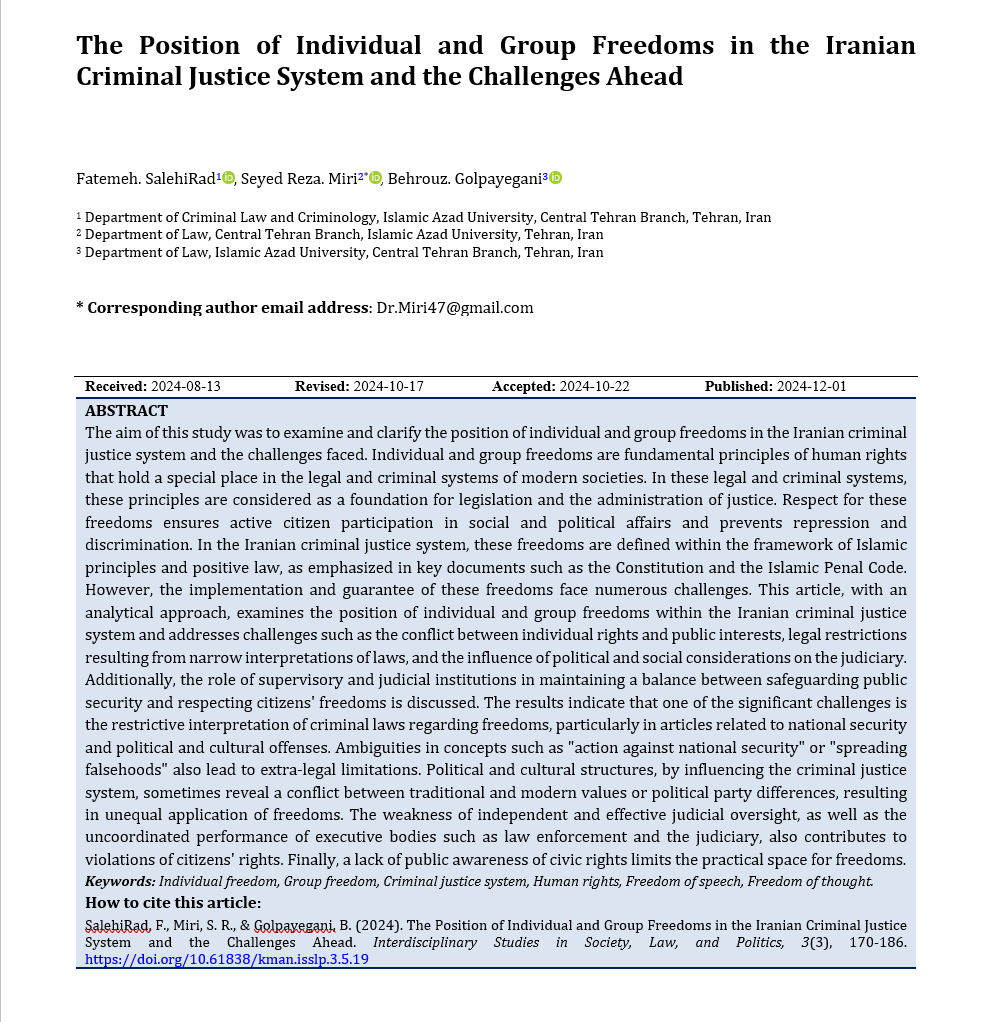The Position of Individual and Group Freedoms in the Iranian Criminal Justice System and the Challenges Ahead
Keywords:
Individual freedom, Group freedom, Criminal justice system, Human rightt, Freedom of speech, Freedom of thoughtAbstract
The aim of this study was to examine and clarify the position of individual and group freedoms in the Iranian criminal justice system and the challenges faced. Individual and group freedoms are fundamental principles of human rights that hold a special place in the legal and criminal systems of modern societies. In these legal and criminal systems, these principles are considered as a foundation for legislation and the administration of justice. Respect for these freedoms ensures active citizen participation in social and political affairs and prevents repression and discrimination. In the Iranian criminal justice system, these freedoms are defined within the framework of Islamic principles and positive law, as emphasized in key documents such as the Constitution and the Islamic Penal Code. However, the implementation and guarantee of these freedoms face numerous challenges. This article, with an analytical approach, examines the position of individual and group freedoms within the Iranian criminal justice system and addresses challenges such as the conflict between individual rights and public interests, legal restrictions resulting from narrow interpretations of laws, and the influence of political and social considerations on the judiciary. Additionally, the role of supervisory and judicial institutions in maintaining a balance between safeguarding public security and respecting citizens' freedoms is discussed. The results indicate that one of the significant challenges is the restrictive interpretation of criminal laws regarding freedoms, particularly in articles related to national security and political and cultural offenses. Ambiguities in concepts such as "action against national security" or "spreading falsehoods" also lead to extra-legal limitations. Political and cultural structures, by influencing the criminal justice system, sometimes reveal a conflict between traditional and modern values or political party differences, resulting in unequal application of freedoms. The weakness of independent and effective judicial oversight, as well as the uncoordinated performance of executive bodies such as law enforcement and the judiciary, also contributes to violations of citizens' rights. Finally, a lack of public awareness of civic rights limits the practical space for freedoms.
Downloads
References
Abdali, M. (2001). The General Theory of Public Order and Good Morals in Civil Law (Comparative Study) PhD Dissertation in Private Law, Tarbiat Modares University].
Ahmadi, S. M. S., & Sham'i, M. (2016). Authoritarian Government and Preventive State Oversight: The Clash Between Security and Freedom. Strategic Studies Journal, 25(79).
Akhavan Kazemi, B. (2018). Justice in the Islamic Political System. Tehran: Institute of Islamic Culture and Thought.
Bagheri Nejad, Z. (2015). Principles of Criminal Procedure Law. Tehran: Khorsandi Publishing.
Berlin, I. (2007). Four Essays on Liberty. Translated by Mohammad Ali Movahhed, Tehran: Kharazmi Publishing Company.
Chegini, M. (2015). Value Orientation in Crime Prevention with an Islamic Approach PhD Dissertation, Qom University].
Falsafi, H. (2011). Eternal Peace and the Rule of Law (The Dialectics of Similarity and Difference). Tehran: Farhang Do, p. 610.
Gharavi, S. M. J. (1998). Analytical Jurisprudence on Controversial Issues. Tehran: Iqbal Publishing.
Ghari Seyed Fatemi, S. M. (2011). Human Rights in the Contemporary World: Analytical Essays on Rights and Freedoms. Tehran: Institute for Legal Studies and Research of Shahre Danesh.
Hashemi, S. M. (2015). Human Rights and Fundamental Freedoms. Tehran: Mizan Publishing.
Hassani, A. (2012). Freedom from the Perspective of Transcendent Political Philosophy. Fourth Strategic Thought Forum,
Hedavand, M. (2016). Comparative Administrative Law, Volume 1. Tehran: SAMT Publishing.
Jafari Langroudi, M. J. (2020). Legal Terminology. Tehran: Ganj Danesh.
Katouzian, N. (2004). Foundations of Public Law. Tehran: Mizan Publishing.
Khalili, A., & Ahmadi Tabatabai, M. R. (2016). The Relationship Between Justice and Freedom from the Perspective of Martyr Motahhari. Contemporary Political Essays, 7(2).
Khomeini, S. R. (2002). Commentary on Forty Hadiths (Arba'een Hadith). Tehran: Institute for Compilation and Publication of Imam Khomeini's Works, Arouj Printing and Publishing, 25th Edition.
Khomeini, S. R. (2006). The Sahifeh of Imam (22 Volumes). Tehran: Institute for Compilation and Publication of Imam Khomeini's Works, 4th Edition.
Mahmoudi Janki, F. (2003). Foundations, Principles, and Methods of Criminalization PhD Dissertation in Criminal Law and Criminology, Tehran University].
Mill, J. S. (2006). Essay on Liberty. Tehran: Elmi-Farhangi Publishing.
Moazzami, A. (2019). Freedom: The Most Controversial Concept in Political Philosophy. Faculty of Literature and Humanities, Tehran University - Mehr News Agency,
Moghaddam, A. (1965). Sovereignty and Global Coexistence of Nations (Vol. Volume 2). Tabriz: Avicenna.
Mohammadi, A. (2012). Foundations of Islamic Jurisprudence Principles. Tehran: Tehran University Press.
Montazeri, H. A. (2004). Treatise on Rights. Tehran: Saraei Publishing.
Nikzad, A. (2006). The Role of Expediency in the Context of Islamic Government Legislation. Women's strategic studies(33).
Qazi Shariat Panahi, A. (2010). Essentials of Constitutional Law. Tehran: Dadgostar Publishing.
Quinton, A. (1992). Political Philosophers. Translated by Morteza Asadi, Tehran: Hoda International Publishing.
Rousseau, J.-J. (1979). Introduction to the Social Contract (Vol. Volume 6). Translated by Shakibapour, Tehran: Chehr Publishing.
Sanaei, M. (1989). Individual Freedom and State Power
Sham'i, N., & Ahmadi, M. S. (2020). Conflict and Balance Between Security and Freedom in the Rule of Law. Tehran: Mizan Publishing.
Tabatabai Motameni, M. (2016). Public Freedoms and Human Rights. Tehran: Tehran University Press.

Downloads
Published
Submitted
Revised
Accepted
Issue
Section
License
Copyright (c) 2024 Fatemeh SalehiRad, Seyed Reza Miri, Behrouz Golpayegani (Author)

This work is licensed under a Creative Commons Attribution-NonCommercial 4.0 International License.





